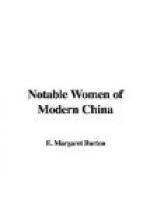Dr. Stone, describing the opening of the hospital to Dr. Danforth, wrote, “The Chinese were very much impressed with your way of commemorating your wife.” Dr. Kahn added that one of the highest officials, who was being shown through the building, signified his approval by emphatically declaring, “It would make any one well merely to stay in such a pleasant place.”
As a matter of fact, work had been carried on in the new building for some time before the formal opening. It had been ready for occupancy none too soon, for in the summer of 1901, the Yangtse River overflowed its banks, working great havoc among the crops and homes of the people living near it. Dr. Stone wrote Dr. Danforth: “Tens of thousands have been rendered homeless and destitute. Some of them are literally starved to death. The sick and hungry flock to our gates, and for several months we have had over a thousand visits each month to our dispensary.” Some idea of the part which the hospital played in relieving the sufferings of the flood refugees is given by an article in Woman’s Work in the Far East, written by Dr. Stone at about this time:
“Perhaps friends would like to know how we dispensed the clothes and quilts so kindly sent us. During the winter months very many needy refugees came to our dispensary daily for treatment. Of course we did not have enough clothes to distribute indiscriminately, but only for those who were the most helpless and miserable. We received them by hundreds, and not only had we to give out medicine, but rice, as well as clothing.”
“One morning when it was raining outside, an old woman came into our dispensary all exhausted, carrying a child on her back, and another buttoned in front within her clothes. The older one was a boy three years old and the tiny baby in her bosom was only three months old. They proved to be her grandchildren, and the old woman said: ’Never in our lives have we gone out to beg before, and for the last three days we have not had a morsel to eat. Before the floods we were considered well-to-do people, and my son is forty years old and a literary man; so he is too ashamed to beg, but tries to help the family by gathering sticks for the fire. His wife is sick in bed with typhoid fever and now the baby has no one to nurse it, and the boy is sick, and I have to take care of them all and beg for a living.’ The woman had on only a lined garment, so we gave her one of those wadded gowns that were sent us, and a tin of milk for the baby, and also sent a little rice to make gruel for the sick woman at home.”




